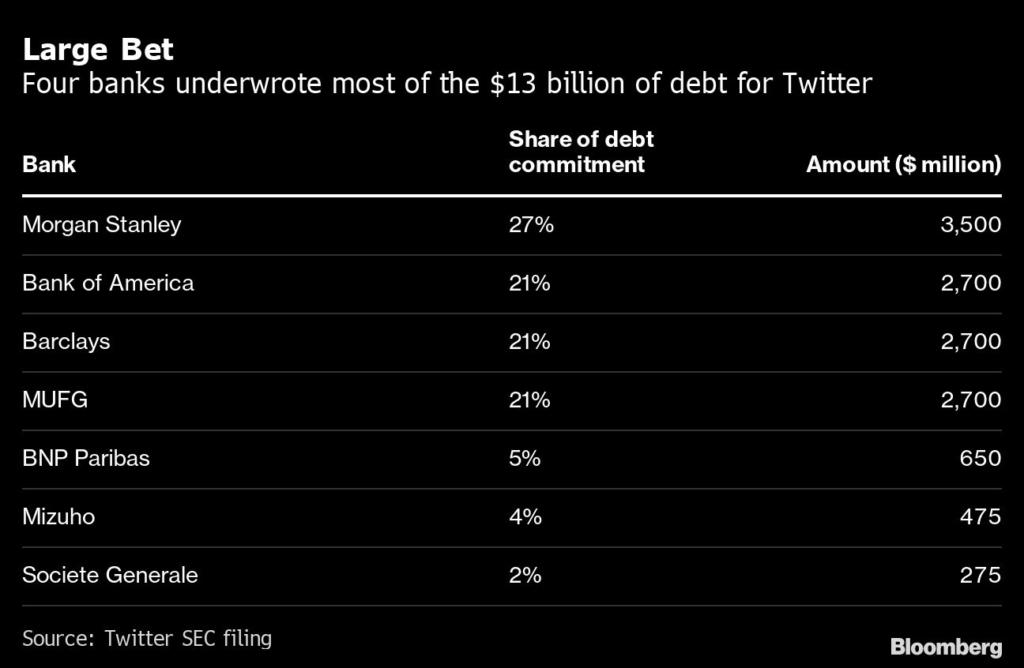Elon Musk pledged Monday to close the acquisition of Twitter Inc. by Friday in a video conference call with bankers helping fund the deal, according to people with knowledge of the matter.
(Bloomberg) — Elon Musk pledged Monday to close the acquisition of Twitter Inc. by Friday in a video conference call with bankers helping fund the deal, according to people with knowledge of the matter.
The banks, which are providing $13 billion of debt financing, have finished putting together the final credit agreement and are in the process of signing the documentation, one of the last steps before actually sending the cash to Musk, said the people, who asked not to be named discussing a private transaction.
Twitter shares jumped on the news and traded as high as $53.18, approaching Musk’s $54.20 acquisition price.
The Wall Street lenders, led by Morgan Stanley, had already been preparing in recent weeks to fund the debt, Bloomberg previously reported. But nothing is ever certain with Musk, the mercurial billionaire who only weeks ago was seeking to back out of the deal. These latest developments suggest he is in the final stages of closing the transaction by a court-issued Oct. 28 deadline.
The banks are expected to receive one of the last formalities — a borrowing notice — on Tuesday, and the cash is expected to be held in escrow on Thursday, the people said.
Morgan Stanley and Twitter declined to comment, while representatives for Musk didn’t respond to a request seeking comment.
Bank Pain
On the call, Musk also promised to help the banks market the debt to money managers after the deal closes, the people said.
That is key for the group of seven banks, which have been left in a lurch after Musk’s sudden reversal to go through with buying Twitter in early October. Normally the banks would offload debt commitments to money managers in the form of junk bonds and leveraged loans before a deal closes, but the compressed timeline and a global deterioration of credit conditions have forced them to keep the debt on their books.
In a normal buyout transaction, the banks, new owner, and company management would come together to hold calls with investors to sell the debt and pitch the business. But the original debt commitment letter stipulated that Musk’s side would help for up to 30 days after closing, and that Musk would participate for at most two hours in any investor meetings.
Banks are facing paper losses of roughly $500 million on the transaction — pain that would be realized once the debt is sold to institutional investors. The average cost of borrowing spiked this year along with accelerating inflation, recession fears, and geopolitical turmoil, well above the 11.75% maximum interest rate that the banks promised Musk on the riskiest tranche of the debt, leaving them on the hook for the difference. Triple-C rated junk bonds are trading at about 15.8% on average, according to Bloomberg index data.
Wall Street banks have already had to use about $30 billion of their own cash this year to fund loans for acquisitions and buyouts that they weren’t able to offload to investors. That would swell to over $40 billion once banks fund the Twitter deal on Friday, as expected.
Read more: Banks Saddled With $30 Billion in Unwanted Debt in Risk Exodus
Twitter’s total purchase price is $44 billion. The banks committed to provide the debt financing in April — when investor appetite for risky assets was more robust — and originally hoped to sell $6.5 billion of leveraged loans and $6 billion of junk bonds, split equally into secured and unsecured tranches.
They also provided $500 million of a special type of loan typically held by banks called a revolving credit facility, which Twitter will be able to borrow from and pay back until maturity.
(Updates beginning in paragraph three with stock move, more context on debt.)
More stories like this are available on bloomberg.com
©2022 Bloomberg L.P.











